Fuck you, George Bush.
Welcome to America.
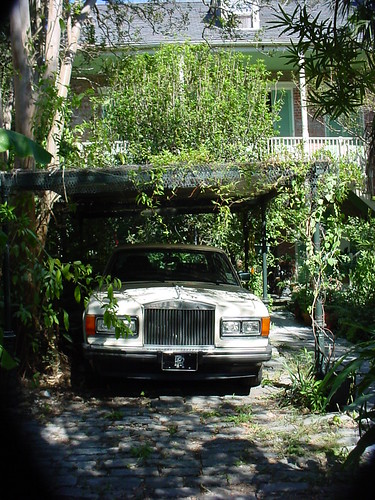
The following is a diary (including a few blog posts) related to my stint as a volunteer that I kept after Katrina hit the Gulf Coast. I spent a mere 3 weeks in NOLA, working for the Red Cross as one of the first people to enter the city limits in an ERV to feed the neighborhoods. I entered the Lower Ninth Ward on the 2nd day that the Red Cross was allowed to go into the city limits. In honor of the anniversary, I 'll be posting it over the next few weeks.
Friday, September 30, 2005I Wish I Was In New Orleans Yesterday I spent all day in an expedited training in preparation to go south to do disaster assistance work with the Red Cross in the hurricane areas. The standard Disaster Assistance training takes days, and normally volunteers require some local experience responding to disaster incidents, before they can be sent off to a national disaster site. But as the trainers told us, this is the worst natural disaster to have ever hit the U.S., stretching over more than 90,000 square miles, and many of the olf protocols and practices have been streamlined in order to get aid to the survivors as quickly as possible.
I still have to get my doctor to sign off on a health status form to assure them I won't keel over dead while I'm down there. We will probably deploy within 2 weeks, but likely much sooner, to either Baton Rouge, Biloxi, or Jackson (not certain about Texas). I don't know where I will be going once I get to the staging area I'll be assigned, nor what I will be doing exactly. I asked to do bulk distribution, that is, travelling around the damaged areas in an ERV to deliver meals and/or supplies and check on the survivors' needs (my first choice), or I may do feeding, sheltering, or casework. They told us we could request specialties, but need to be flexible, as we will probably do a little of everything as needed, and will be put wherever they need us.
Regardless of what happens, I doubt I will have access to a computer, or that I will have the time to post anything if I do. People who were there during the worst of it spoke at the training session to tell us what they experienced, and as has come out the last few days, the reports of dangers and shootings and criminal behavior were very much overblown. But they worked 20 hour shifts, and slept in sleeping bags on the shelter floors, and the temps were 95 degrees with 80% humidity and bugs from hell, and people are traumatized and angry and in need of much patience and understanding. The weather and the bugs, they told us, will probably be the same till mid to late October. We may stay in hotels--there is more of that now--and electricity and water are available more widely, or we may be put in shelters. The shifts will probably be closer to 8 to 12 hours than 20. It's much better now than it was a few weeks ago. Traveling down will require going light, so I'll pretend I'm going backpacking. Toilet paper, insect repellent, sunscreen, and every expectation of living in dirty clothes for much of the time...sounds like the woods to me, except that I will have my cell phone with me at all times, as they recommended.
Don't think that just because a few weeks have passed that things are almost wrapped up. On hearing about me going down, some have said, "Oh, I thought they stopped sending people down there." They haven't, obviously. They need volunteers badly. The Red Cross chapter I will be part of, Southeastern PA or SEPA, is the 2nd largest in the country, and they have only gotten 90 people down there since Katrina hit, for 2-3 week stints. That's just 2 waves of volunteers. They expect to need people at this level through December, and the holiday season may be a time of even greater need. In Philly alone they have been working with over 700 families displaced by the storms, and over 600 of those came up here on their own without government or NGO aid. Just this morning the NYTimes reported that FEMA has only been able to house 109 families from Louisiana, which means hundreds of thousands remain homeless and in shelters and hotels.
Anyway, that's the situation so far. I have my employers to thank for allowing me to take this time off when it comes, and for paying me for it while I'm gone; otherwise I would never be able to afford to do it. It's a gift that's been offered to me, so I want to make it a gift to the people of the hurricane. I know many, possibly most people, are unable to afford the time away from work or their families, and this kind of work is not for everyone. But if you can possibly do it, if you are physically and emotionally and financially able to do it, please consider volunteering. The need is desperate.
More updates as the time gets closer.
Thursday, October 06, 2005Good Night And Good Luck If you read my previous post on the subject, you know I signed up to do Red Cross disaster assistance for the hurricane survivors. Well, today I got the call, and at the ungodly hour of 5:40 a.m. on Sunday morning I'll be leaving Philly for Baton Rouge. That's the staging area I'm being sent to, and the place whose hurricane damage Bill Clinton, upon his visit there Tuesday, called "astonishing." I heard him talking about it on the radio, and in a few brief minutes he spoke more sense about the disaster and its ramifications for the region and the country than I have ever heard come out of George Bush's mouth in 5 endless years of stumping and photo ops.
Anyway, I'll be away for 3 weeks, so this my temporary sign-off till I get back in November. Lately I've missed a lot of great opportunities to write loud and bitter polemicals against the increasing stupidities of the age, and now it's too late. And I'll miss being here for my favorite month of the year, and my traditional October reading of stories of the supernatural on my daily commute. I'll miss my family, and my home, and my pets, and all the old familiar things that I usually bitch so much about. And it's kind of scary, not knowing what lies ahead, or what people will think of me when I get there.
Then I think that the people who suffered through the storms are also missing many of those same things, and the difference is that I'll get to come back to my life and my precious things pretty much the way I left them, whereas those folks will never be able to. And the people who have been uprooted and forced to disperse to strange places where they have no friends or family are also scared, and the stakes in not knowing what to expect are so much higher for them.
So I think I'll just shut up now, and wrap this up. Wish me bonne chance, and that I can make myself useful.
The DiarySunday, October 9, 2005---Philly to Atlanta6:05 a.m.---Left home at 4:00 a.m. K. drove me to the airport. Missing everything. Yesterday felt like a condemned woman, trying to enjoy what she could for the last time. I hate to leave him alone for so long. Never been away from him this long in 30 years.
Flight was scheduled to leave @ 5:40 a.m. Even so, the number of people waiting to check in was horrendous, and they all had weeks’ worth of baggage. Luckily the Delta employee announced all those with “E” tickets could move over to the kiosk check-in, which was much sparser. However, the fancy computer self-service was not finding me, and it turned out the system had me as “R.”, and my driver’s license read as “R. X.”. Once that was cleared up I proceeded to the security check (take off your jacket, leave your shoes on), then on to the gate.
Last called, seat assignment at the last minute, and they overbooked. I feared the worst, but instead got a 1st class seat on the aisle (2C). Luxury! The flight to Baton Rouge, though, looks like steerage. At least it’s short.
9:45 a.m.---About ½ hour delay due to traffic on the runway. Lots of sleepy people on this flight. From the conversations overheard here and in the airport, many may be with the Red Cross or similar agencies. Other people seem to be flying home, or off to visit friends or family.
The clouds never fail to amaze me, no, enchant me, when I fly. Looking out on their endless banks you can forget what they are. They look so solid—sometimes like stretches of Antarctic ice and sea, broken by small icebergs. Or dark, hulking mountains on a horizon of lakes and hills. They are always remarkable.
K. prevailed on me to wear my anorak before leaving since it was cool and rainy, and all I could think of was how hot it would be in LA. But the trip has been chilly---the airports, the planes---and I’m glad to have it. I called him from Atlanta just to say high.
I’m so sleepy. I feel like I’ve been sedated.
12:15 a.m.---Staging area, Baton Rouge, at the old (read “ex-“) Wal-Mart. They put me in “Feeding” and sent me off to get my photo ID. I have to participate in the orientation before I can be assigned anywhere. I kept saying to the woman who processed me, I wanted to do Bulk Distribution. She said “They need you in Feeding.” So off I went. When I went to talk to the supervisor of that section, she said they could use people who could drive, and could I drive a box truck? Well, I said, yes, though I’ve never driven one in my life. But she didn’t say “Did you ever drive a box truck?” Only whether I could. Well, I’ll give it a try. It’s what I get for insisting on trying to have it my own way when I should have said “Put me where you need me.”
Walking around the place. It’s set up like some kind of cheesy health fair, but the breadth & depth of the services is amazing, for both infrastructuring and staff support. All our luggage is living under a couple tents inside a fenced area that looks to be where Wal-Mart once had its garden center.
I wander like a lost soul. Won’t know where I’m going until after orientation, and maybe not even then if I don’t get picked. Means staying in a shelter here overnight.
1:30 p.m.---Had a very nice BBQ chicken lunch thanks to the efforts of the local union (Electricians/AFL-CIO). Found out I’m going with 5 others to Kenner, just outside of New Orleans. From one staffer I heard it was bad: depressing, hard times for the folks there. On the other hand, other staffers said it was great: a hot shower truck, great food, next door to the police, near the NOLA airport.
This is the closest I’m going to get to being right inside the city. I’m pleased.
7:30 p.m.---Our Lady of Mercy Shelter, Baton Rouge. Since I had to complete orientation before leaving, and they couldn’t wait for me, they sent off a vanful of folks to Kenner without me. I got sent here to spend the night, and have to return tomorrow by 8:00 a.m. to the staging area (Headquarters) for a new assignment. They need to send people to Covington, directly opposite NOLA on Lake Ponchartrain, and as of 3:20 today, that looked the most likely. But who knows?
I had dinner with two older women this evening, both case managers, S., originally from Wales, and C., who told me she spent much of her time in Lafayette and at the Cajundome in a smaller version of the Superdome/Astrodome paradigm. They had her running a 70 mile circuit every day in a rental car, starting at 6:00 a.m. when she got up in her little motel room and set out, ending at the Cajundome to do 3 hour meetings with Family Services people. Got back about 10 p.m. Exhausting. She had the day off yesterday (we’re supposed to get 1 day off every 7 days), and spent it traveling around Lake Charles. She said the devastation was endless—for miles and miles, as far as they could travel, trees flattened or twisted into impossible shapes, building simply vanished!
A woman is just now saying she’s working at the River Center. Others saying I thought they were closing that. She saying no one told me. They’re down to 6000+ residents from over 11,000.
The food down here is all sugar and salt and fat. C., S. and I went to a place called Piccadilly’s a jumped-up cafeteria with pretensions to a clubbiness hopelessly destroyed by bad paintings and absurd Jetsonesque chandeliers.
Tired.
=====
Louisiana Diary: next, home
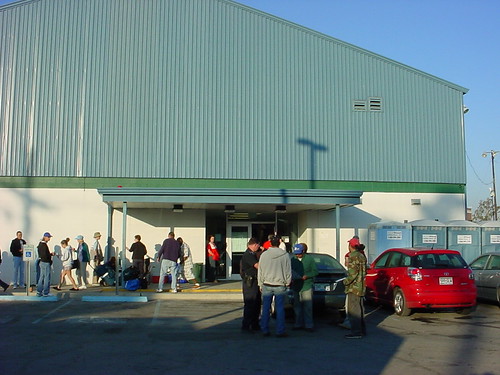
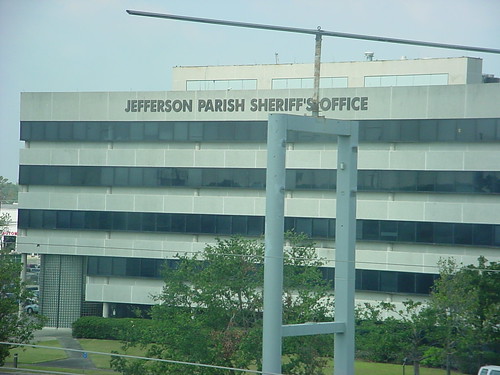
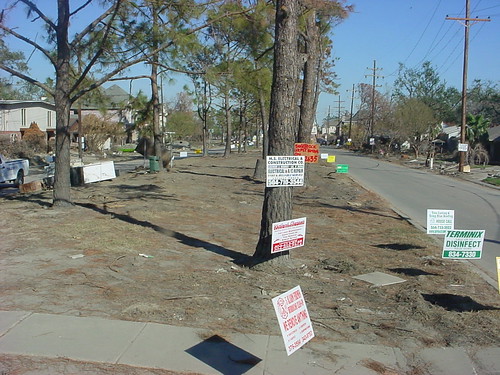
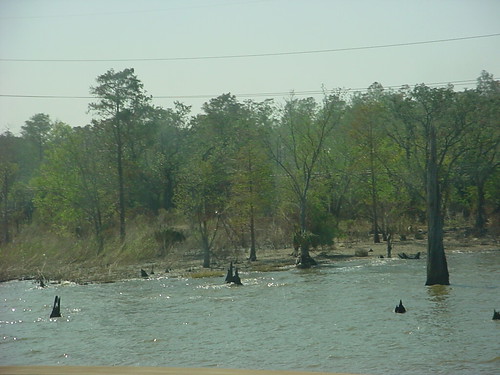

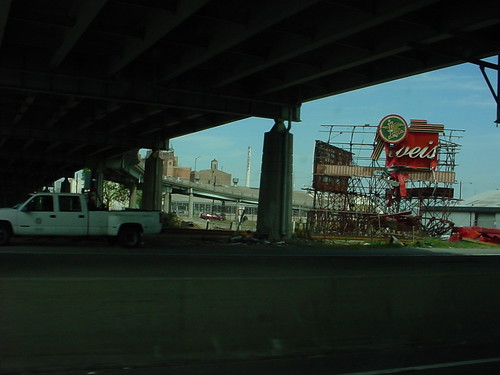
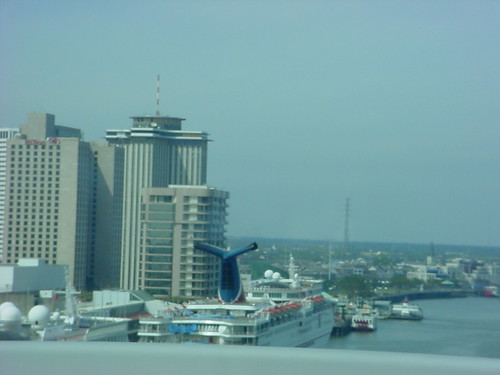
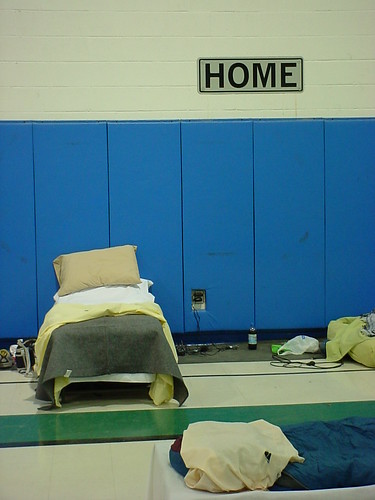
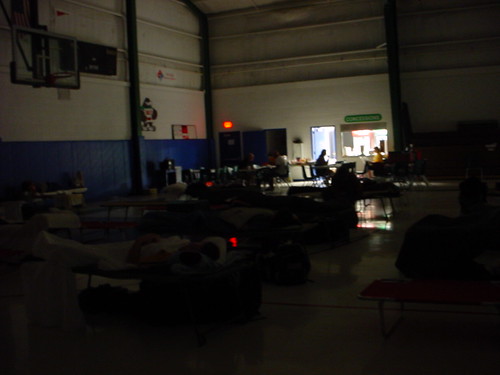



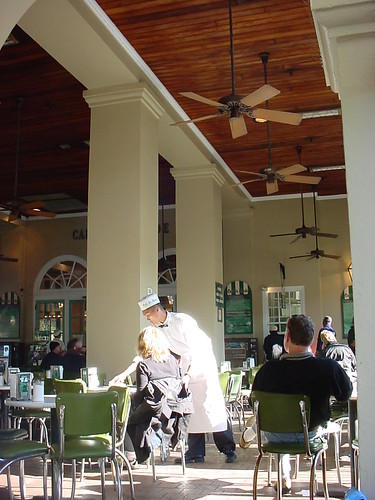 August 29th has become the accepted date representing the anniversary of the Katrina disaster in New Orleans, as well as the rest of the Gulf Coast. The blogs, the press, the networks are alive with the rediscovery of the fact that hundreds of thousands, of the orginal estimated 1 million displaced, are
August 29th has become the accepted date representing the anniversary of the Katrina disaster in New Orleans, as well as the rest of the Gulf Coast. The blogs, the press, the networks are alive with the rediscovery of the fact that hundreds of thousands, of the orginal estimated 1 million displaced, are 
